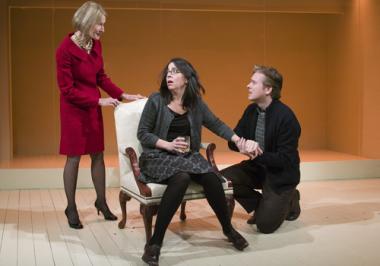For the first five minutes of Dead Man's Cell Phone, now playing at TheaterWorks in Hartford, we're way ahead of the heroine, Jean, as she dines alone in a caf?, because we know the play's title and she doesn't. So when the phone on the table next to hers rings and the middle-aged man sitting there doesn't answer it—and when it rings again, and then again, and he still doesn't raise a finger—she's annoyed and frustrated, but we're already laughing. And we're laughing harder at her subsequent alarm when she discovers what we've known since the phone first chirped.
But from the moment she, in bewildered exasperation, answers the phone herself, we're right in there with her in a rising series of uh-oh's as, one by one, she learns the facts of and meets the people in dead Gordon's life.
Sarah Ruhl's play is a comedic mirror image of one of those thrillers in which an innocent gets caught up by accident in dangerous doings. One of the plot threads does take us to that perilous cliff edge (and over it into a surreal glimpse of heaven) but most of the tight corners our impulsive heroine finds herself in are merely bizarre—and what's more, of her own making.
Not only did she not have to pick up that phone in the first place, she doesn't then have to drop in on the man's funeral, where his ice-queen mother delivers a eulogy punctuated by—you guessed it—cell phones going off in the congregation. She also doesn't have to meet the man's self-regarding mistress for a drink, or accept the invitation to dinner with his family. And, even though she doesn't feel comfortable telling people she never even knew him but only answered his insistent cell phone after he expired, she certainly doesn't have to say she was a colleague at his job, when she has no idea what that was and saying so elicits shock and awe from people who do.
But since she was the last person to see him alive, she feels a curious responsibility to the dead stranger's memory. Gordon turns out to have been a rather unpleasant and utterly unscrupulous fellow who made his living in a rather unsavory occupation and cared for no one but himself. So Jean finds herself making up for that, post mortem, reporting kind words he never spoke, inventing regrets he never had.
Playwright Ruhl somehow makes all this plausible in a tipsy kind of way, and Finnerty Steeves, as Jean, makes it hilarious. She's all hapless diffidence in her awkward attempts to please, with moments of deer-in-headlights panic when her reckless improvisations backfire. It's a deliciously giddy performance that in itself is more than worth the price of admission.
We eventually meet the cell phone's deceased owner, too—not in a flashback to his life, but in a kind of fireside chat from beyond the grave. Craig Wroe has the ticklish job of making a thoroughly unlikable character charming, or at least amusing. He works hard at it, and the effort shows. Every gesture, inflection and self-satisfied smirk is so carefully studied that it comes off looking more like an audition piece than a performance.
His fellow performers, though, are perfect in their quirkier-than-life roles: Anne-Lynn Kettles as Gordon's dictatorial mother; Lee Heinz as his semi-grieving widow, who confesses in a semi-sloshed moment that she could only enjoy sex with her philandering husband by imagining that she was another one of his mistresses; Mark Shanahan as his brother, still smarting from their mother's lifelong preference for his undeserving older sibling; and Joey Parsons as Gordon's bit on the side, a flinty beauty who nonchalantly assumes Jean was another one of his conquests and gives her tips on womanly poise and lipstick application (to the accompaniment of a sultry sax, compliments of sound designer J Hagenbuckle).
Rob Ruggiero's pitch-perfect staging keeps our first knowing chuckles rising into full-throated guffaws as the play weaves its wacky spell. Michael Schweikardt's set is a bare platform placed in front of a clear glass panel and a receding series of proscenium frames, giving the impression of those facing mirrors that multiply your image into infinity. It's a nice metaphor for the funhouse tangle Jean gets herself into. And the play is a timely reminder that, while dead men may tell no tales, their Friends & Family Plan does.
Dead Man's Cell Phone: TheaterWorks, 233 Pearl St., Hartford, through March 15, (860) 527-7838.
*
City Arts on Pearl
The run of Dead Man's Cell Phone coincides with the unveiling of the newly restored period foyer on the ground floor of TheaterWorks' headquarters on downtown Hartford's Pearl Street. The "Lion of Pearl" lobby fountain in the venerable Art Deco building—now rechristened City Arts on Pearl—has been touched up, and a wine bar (still awaiting a full license) is tucked into the corner of the next-door gallery.
The opening also heralds a new partnership with the New Britain Museum of American Art. Large pieces from the museum's collection grace the lobby and the gallery features a rotating exhibit. Currently on view is a deliciously tawdry retrospective of pulp fiction cover art from drugstore magazine racks of the 1920s, '30s and '40s. The original paintings, paired with the actual covers from serials like True Crime and The Shadow, feature nearly-nude damsels in distress and bare-fisted tough guys, the latter including one arresting image of underworld torture that's posed like Michelangelo's "Pieta." Who sez it ain't art?"



